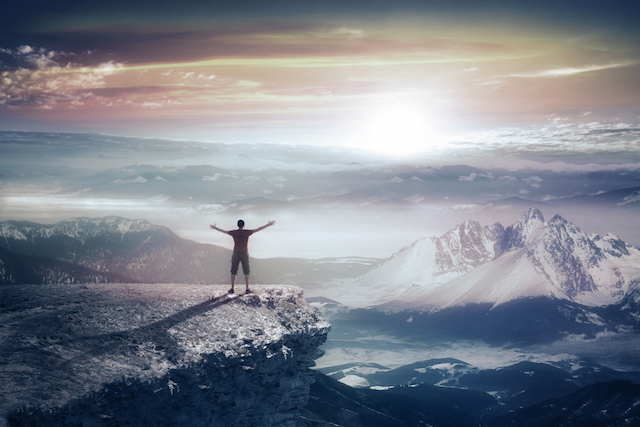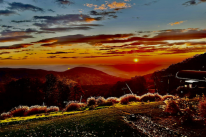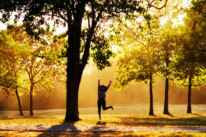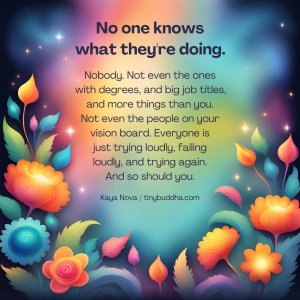
“I am not what happened to me. I am what I choose to become.” ~Carl Gustav
It used to be my favorite guided meditation. You know the one about the mountain, where you imagine yourself as the mountain? Strong, tall, standing firm in the face of all that comes at it—rain, hail, shine. Letting it all wash off without getting rattled by it.
One of the reasons I used to love that particular guided meditation was because I could relate to it. I could relate to it because I love mountains. I love trekking and I love mountains. Big mountains. Immovable. Stable. Reliable. Regardless of what was thrown at them.
Then the mountains moved. I found myself in Nepal at over 4000m above sea level, scrambling to stop my body from sliding down the side of the mighty Himalayas as a 7.8 magnitude earthquake cracked open these mighty mountains and shook them from 18km beneath the ground.
I can’t even bring myself to listen to that meditation any more.
I heard it before I felt it. It sounded like a deep guttural scream, the earth itself crying out in pain. No other sounds, no animals, no people, just this sound unlike any sound I’d ever heard before.
Stillness and quiet followed—for what was probably only seconds—before my life was fundamentally redefined.
Before boulders the size of cars came hurtling down the mountain, before the narrow path on the steep ridge I was trekking started to literally disappear beneath my feet, before I could hear someone screaming for me to run.
I remember every detail. Every little detail. I wish I didn’t.
Sleep was a luxury not afforded to me as aftershocks continued through that first night, forcing the group of us sheltering in what was left of a Tea House out into the snow and below freezing temperatures time and time again.
Surviving the actual earthquake was only the beginning and it was a challenging and emotional journey as I made my way, through devastated villages, down the mountain. The aftershocks continued for several days, with one in particular carrying almost as much force as the actual earthquake.
Patchy reports of what had occurred in Kathmandu, Everest Base Camp (where I had been two days before) and other villages were coming through. I was devastated and bewildered.
As the days went by I continued to make my way down the mountains. The Australian Embassy was advising that until I got myself back to Kathmandu they couldn’t help me. The Australian Defence Force was being deployed to assist. The reports of casualties and devastation became clearer.
In all, over 9,000 people lost their lives. I personally knew one of those people, but every day I pray for all of them.
The trauma, destruction, and death I was experiencing and witnessing every day for five days altered my sense of being entirely.
Visions that would normally bring me to my knees were becoming commonplace.
Stepping over the bodies of beautiful souls, crudely wrapped in blue tarpaulins far too small for the job, became just something I had to do to get to safety.
Watching as a fellow trekker’s body burned in a traditional Buddhist cremation, out in the open on the side of a hill. Watching as his friends gathered his ashes in a bucket to take home to his loving family. Watching, but not really seeing… it was like I was outside of my body, looking on.
Days went by before I found myself standing outside the Australian Embassy in Kathmandu. You would think I could start to feel safe, but Kathmandu was badly damaged, and mourning the massive loss of lives. There continued to be aftershocks. It was not safe.
Still, the welcome sound of the Aussie accent and the welcome sight of fresh water, food rations, and tents in the Embassy grounds were extremely comforting. More comforting was the next night, taking my seat on a plane to Malaysia, before a plane to Sydney. However the comfort, the relief, was mixed with bewilderment and much sadness. There was a part of me that didn’t want to leave.
Coming home was bittersweet. I was, of course, extremely joyful to be hugging my family and friends, but the event had taken its toll and I wasn’t remotely who I was when I had left Australia only a month before.
Shock and trauma had settled in me now that I was out of immediate danger, my body shut down, and my mind shut down. I was a mess.
A few months on, and I’ve been able to look back at this time. I learned some things through this experience, mostly about myself, and I’d like to share these:
Without any warning, things can change. You can change.
I used to see natural disasters in foreign countries on the news and watch as travelers were urged to get to their Embassy and governments rallied to evacuate their citizens. I never thought it would happen to me though, because these things happen to other people. Right? Wrong.
Things can change regardless of how well you plan. Things changed, and well, I changed—in that split second where I fought for my own life, and the times in the days to follow where I felt it was likely my end, I changed.
This experience will forever be a part of who I am, and has irreversibly redefined me and my values. I have learned that as much as we like to think we have it all under control, we don’t, and we need to be prepared to change.
Embrace surrender and acceptance.
I now have a better understanding of what it means to accept and surrender. It doesn’t mean that I won’t have goals and I won’t plan, but I now understand what I can control and what I can’t control. Consequently, I know now that there really is very little in this life I can control. I’m not perfect at this, but I am getting better, day by day.
When life does what it does, we can embrace each situation and accept it as it is, or we can demand that life be some other way. In the words of Eckhart Tolle in The Power of Now, “Whenever you are not honoring the present moment by allowing it to be, you are creating drama.” When we have no control of the situation, demanding it be some other way is a drama.
Your best, at each moment, has to be good enough.
The trauma and constant stress of living one minute to the next for five days, along with the situations I found myself in, and witnessed, not knowing if I would live that day or die, took its toll on me.
Everything came back to basics—safety from landslides and aftershocks, a supply of clean water and some shelter and warmth were the key priorities. My ability to think straight, my ability to comprehend what was happening, my capacity to fathom the extent of the destruction and death—all of these were compromised and this affected my thoughts and my behaviors.
We all just have to do our best, in every moment, because it’s all we have and that has to be good enough. Let’s be gentle on ourselves.
That which you think you can’t possibly get through, you can.
If you had asked me if I could get through the experience I went through, before I went through it, I likely would have said no.
I have learned that we are capable of so much more than we give ourselves credit for. Not only capable of surviving traumatic experiences, but showing compassion, love, and nurturing along the way; taking the gifts, however disguised they may seem at the time; and allowing change and growth to occur within ourselves. Walking right up to it, leaning in to it.
We can get through it, even when we think we can’t.
It’s okay to not be okay.
I hope to listen to the mountain meditation again one day, just as I hope to trek mountains again one day. The mighty Himalayas are still there. In parts, they look a little different and some are even a bit broken. But they remain, standing strong, in the face of the devastation they have had to witness.
I aspire again to be like that mountain. I’m a bit broken too, but I stand up again and face this life with a gratefulness that I wouldn’t have, had it not been for this experience. At the sound of a helicopter you will find me under the nearest table, and sudden loud noises bring me to my knees.
I struggle to hold a conversation about my experience without tears streaming down my face. I’ve learned that even though we might not be okay right now, and we might be a bit broken in places, we can keep getting back up, every day. Every single day.
—
I recognize the pull in my heart to return to Nepal; I accept that yearning and commit to returning when the time is right. I breathe in my life every second and I endeavor to practice acceptance in a much more authentic way than ever before.
I have changed—I’m not who I once was. That thing I thought I would never be able to get through, I did, and it has redefined my entire being.
I tentatively welcome the gifts from this experience each day, while never forgetting to honor my fellow adventurers who didn’t make it home and the beautiful people of Nepal, who lost their lives that day when the mountains moved.
A beautiful and wise friend who shared this journey with me has always told me that there are gifts in everything if only we look closely enough.
Whatever it is you’re going through, have faith that you will get to the other side, and when you do, remember to look closely enough to recognize the gifts from your experience, and welcome the personal growth and change in yourself.
Man in the mountains image via Shutterstock
About Michelle McFadyen
Michelle started trekking in 2009 summiting Mt Kinabalu in Borneo, and went on to trek the arduous Kokoda Trail in Papua New Guinea three times. In 2014 she summited both Mt Meru (4555m) and Mt Kilimanjaro (5895m) in Africa. Just days before the devastating earthquake on 25 April 2015, Michelle made it to Everest Base Camp in Nepal.













 Though I run this site, it is not mine. It's ours. It's not about me. It's about us. Your stories and your wisdom are just as meaningful as mine.
Though I run this site, it is not mine. It's ours. It's not about me. It's about us. Your stories and your wisdom are just as meaningful as mine. 